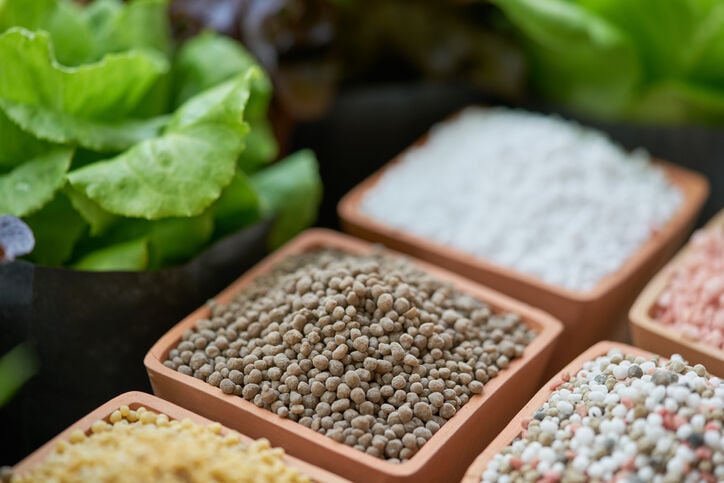You may have noticed some of your plants’ leaves turning a light green or even yellow after our recent rains. This may be because high rainfall tends to wash nutrients out of the soil. Your plants (usually the non-native ones) may benefit from the application of some fertilizer. But which one to choose?
Synthetic fertilizers are fairly easy to apply and contain more nutrients per weight than natural fertilizers. They do have some drawbacks, however. It is easier to over-apply them and burn or kill your plants. They also usually do not contain any organic matter or micro-nutrients — you are only giving your plants the macro nutrients nitrogen, phosphorus and potassium (the N, P, and K listed on the label). It’s a bit like eating a mega dose of vitamin C rather than eating an orange — you get too much of the vitamin C and none of the other nutrients found in the orange. In addition, the manufacturing of synthetic fertilizer requires a fair amount of fossil fuels.
Natural or organic fertilizers, however, are a good option for your plants. They tend to contain organic matter (carbon) along with N, P, K and micro-nutrients. It’s difficult to over-apply them and hurt your plants because they need to be processed by soil organisms to be absorbed by the plant. Many are waste products from other industries, and thus are a good way to use our resources.
Animal-sourced fertilizers
Bone meal: This product is made from ground up animal bones that are a waste product from slaughterhouses. It’s NPK ratio is 3-15-0, so it has a lot of phosphorus. In our alkaline soils, the phosphorus does not absorb very well. You can add this to composted manure to have a more balanced fertilizer. You can also use it in containers, where your soil pH is likely to be closer to neutral (pH 7). However, don't use it for plants that like very acid soils.
Blood meal: This is dried, powdered blood from slaughterhouses. Blood meal has mostly nitrogen and releases its nutrients over two to six weeks. Its NPK ratio is 12-1.5-0.5. Due to its high nitrogen content, it’s important not to use too much so you don’t harm your plants.
Fish meal: Also called fish emulsion, fish meal is relatively high in nitrogen with an NPK ratio of around 8-6-0. It uses fish parts that are cast off from the seafood and fish oil industry. It can be pretty smelly, and like all animal-based fertilizers needs to be used with care due to its relatively high nitrogen content. If you have spare fish parts lying around, you can even make your own.
Manure: Animal manure must be composted before it is safe to put on any plants. The only exception to this is rabbit manure, which can be put directly on the garden soil. As you would expect, animal manure is high in nitrogen — its NPK ratio varies depending on the source and how long it’s been composting, but is usually close to 1-1-1. A special type of animal manure is worm castings (worm poop). It has very low NPK values but has lots of beneficial soil bacteria and other organic matter. For more information on using manure in your garden, check out this excellent publication from the University of Arizona extension office.
Plant-based fertilizers
Compost: Compost is perhaps the best all-around fertilizer for your garden. It consists of plant matter, soil organisms, and invertebrates that have died and been broken down in the soil by various critters. As a result, it not only has great nutritional value, but also plays a huge part in improving soil structure and water retention. If you put nothing else on your garden, use compost. Keep in mind that in our climate, locally-produced compost will tend to contain more salt and be more alkaline than packaged imported compost. This will not be a problem for most plants, but it may be an issue in your vegetable garden, particularly if it’s in a container. You can purchase imported compost, but make sure it doesn’t contain peat moss.
Seaweed fertilizer: Fertilizers made from seaweed come in various forms, and are a great source of micro-nutrients for your plants. Its NPK ratio is usually around 0-0-1, so it’s mainly a source of potassium and needs to be applied with other fertilizers.
Cottonseed meal: This is a byproduct of the cotton industry, and is a great nitrogen-heavy fertilizer with an NPK ratio of around 7-3-2. It also has a good amount of organic matter and can be used fairly liberally without worrying about overdosing and plant damage. It’s slow-release, too, so it’s a good option for perennial plants.
Alfalfa meal: This is made up of ground up alfalfa plants and is a great all-around fertilizer with an NPK of around 3-2-2. It is usually fairly inexpensive, and can be found in bulk quantities in feed stores. It is alkaline, so don’t use it if you’re trying to grow acid-loving container plants. Rodents will happily eat it, so keep it in a pest-proof container.





